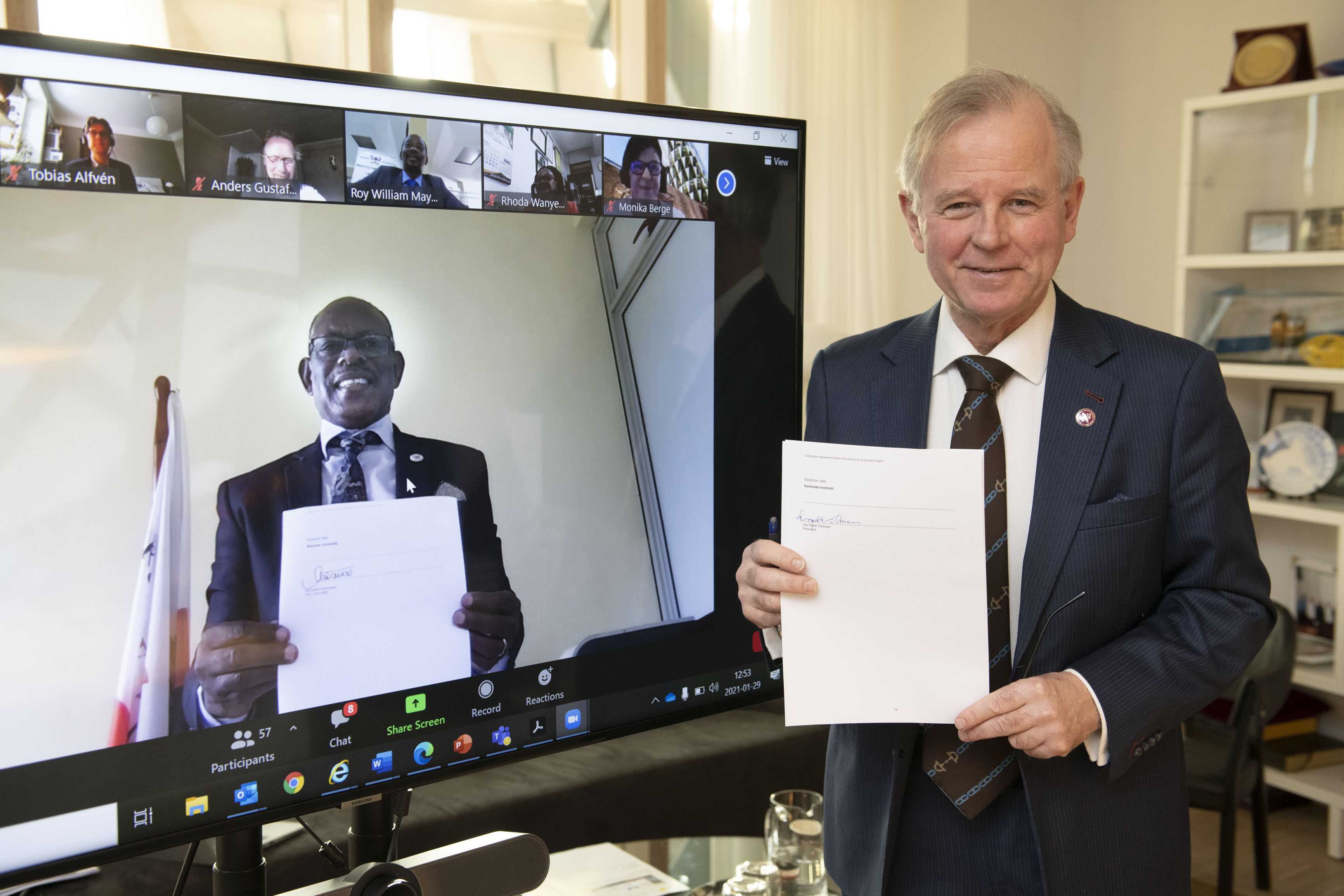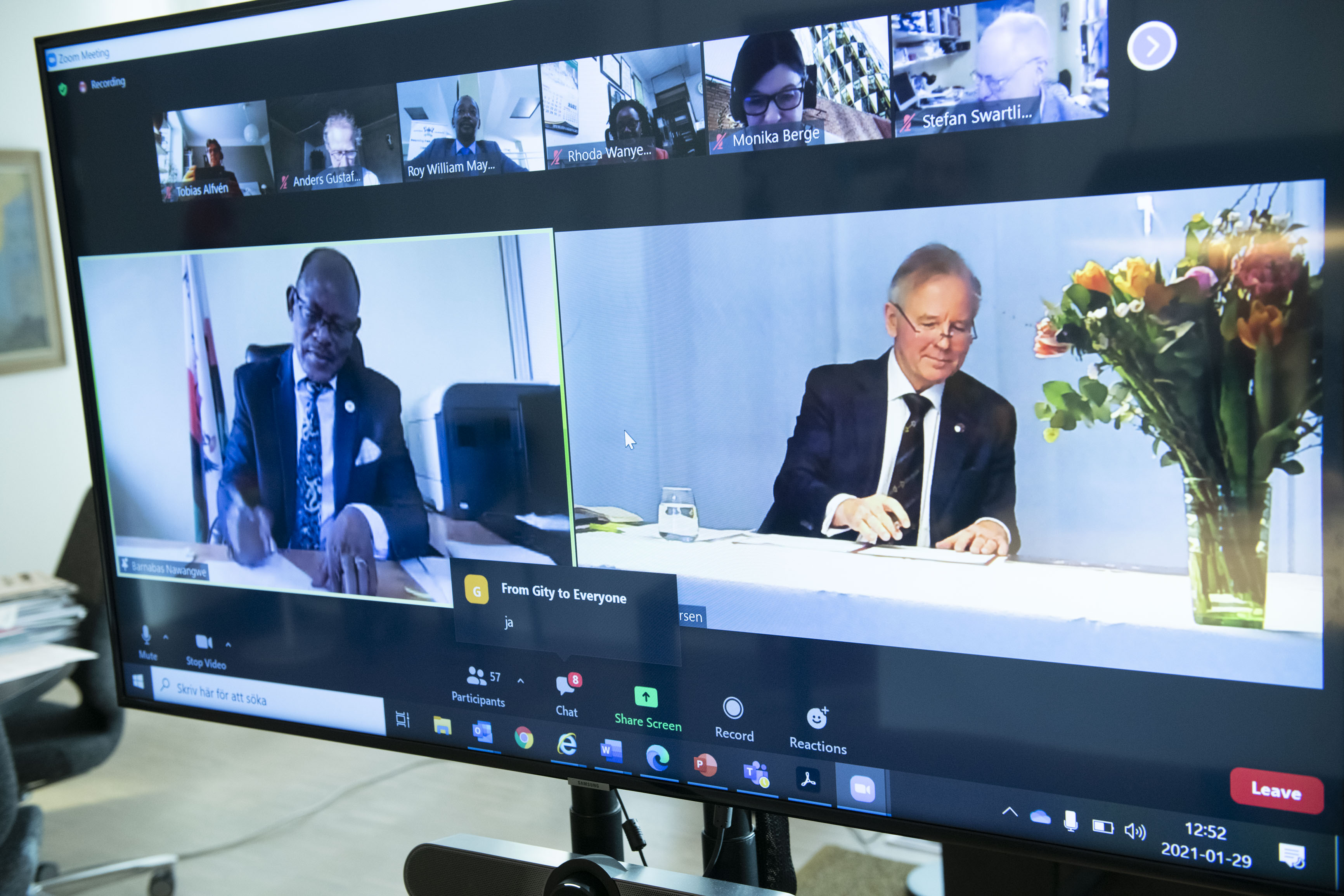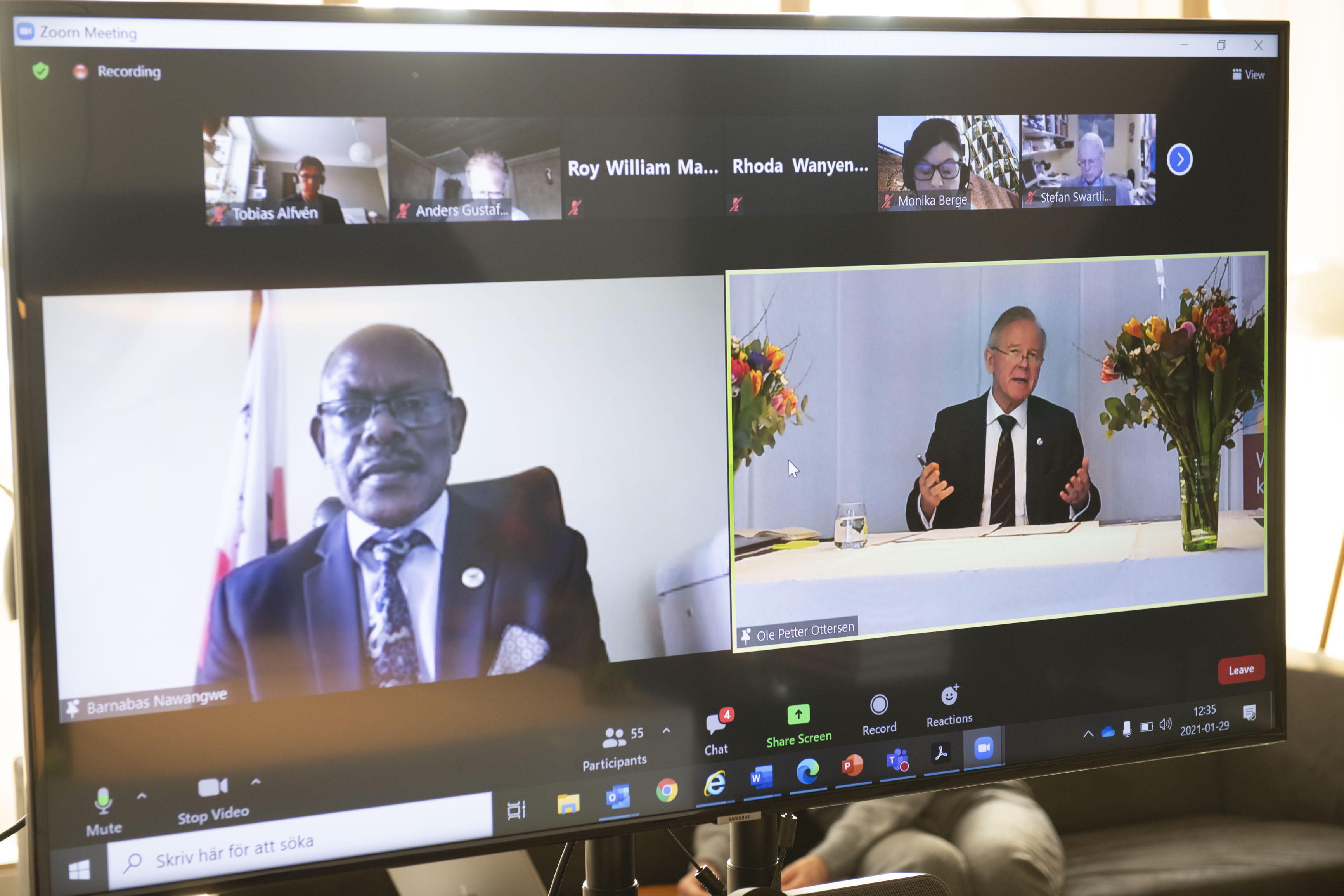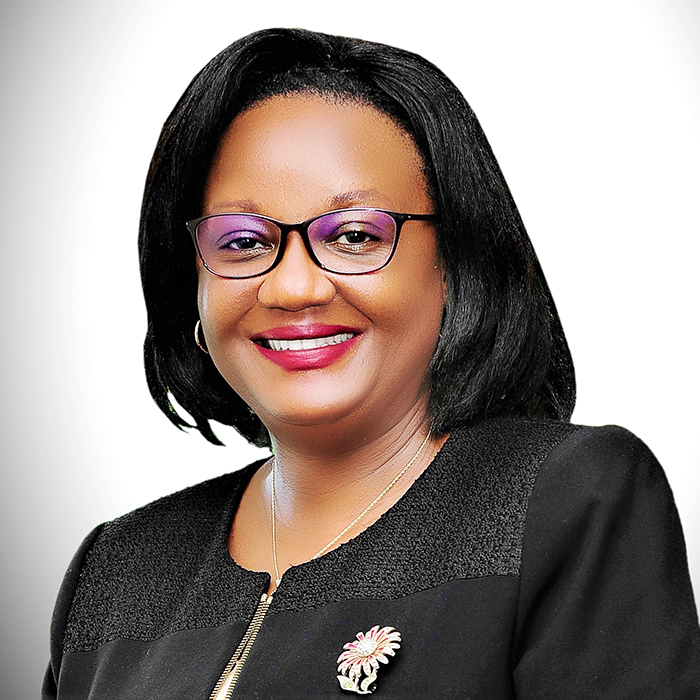
KI’s President, Ole Petter Ottersen, and Barnabas Nawangwe, Vice Chancellor at Makerere University, signed an agreement to establish the Centre of Excellence for Sustainable Health on 29 January 2021. Photo: Ulf Sirbom, Bildmakarna
Representatives from Karolinska Institutet and Makerere University on Friday (January 29) signed an agreement, furthering an alliance between the two research-led universities.
The collaboration agreement was establishing the Centre of Excellence for Sustainable Health – CESH. This Centre seeks to promote partnerships, develop capacity, resources and tools to drive the agenda for sustainable health.
Professor Barnabas Nawangwe, Vice Chancellor Makerere University, and Prof. Ole Petter Ottersen, President Karolinska Institutet, signed the agreement in a virtual ceremony.
The agreement is a step in the deepening of the collaboration between the institutions and a major leap towards driving the agenda for sustainable health.

“Fueled by our experiences in COVID-19, we see an urgent need to build universal preparedness for health and I am convinced that the new Centre will contribute significantly to this. My vision is that the Centre of Excellence for Sustainable Health will help transform how research and policies are formulated and conducted in the area of sustainable health”, explained KI’s President Ole Petter Ottersen.
Professor Nawangwe said that the signing ceremony marks a milestone of deepening the successful cooperation between Makerere University and Karolinska Institutet.
“This is an important next step in the long-standing collaboration between Makerere University and Karolinska Institutet. Deepening our partnership will be a significant contribution to increase action to achieve the Sustainable Development Goals of the United Nations’ 2030 Agenda”, said Professor Nawangwe.
In a dialogue preceding the signing session, the two heads of KI and Mak shared warm experiences and visions for the partnership. They also congratulated each other on the roles the institutions are doing to support efforts to curb the global pandemic.
Professor Nawangwe highlighted the pivotal role Makerere University as a key research institution in Uganda is doing to support national and global efforts in the fight against the coronavirus pandemic.
He says while the pandemic has brought problems, it has shown some realities of what the world is.
“The effects of the pandemic on the African continent have been a blessing in disguise. It has been what I could call ‘a rude awakening of Africa’ because Africa was for the first time completely isolated in many ways. That forced us to begin thinking what do we do? We must find solutions to our problems including health problems. And that is why you see a lot of efforts by our researchers to find solutions for COVID-19,” Professor Nawangwe.
KI’s President Ole Petter Ottersen said many projects that have been set up in the name of global health have largely been short term and sort of ‘hit and run projects’.
He contends that there is a need to put into context collaboration the elements of long-term perspective and with ambitions to end up in policy changes and implementation of new knowledge in order to have a permanent change for the better when it comes to health policies.
According to Ottersen, this global pandemic has put the world at crossroads that requires more attention to be paid to the global challenges whose targets were set for 2030. He also highlighted the need to use this pandemic as an opportunity to bolster efforts to the goals of agenda 2030.

“I think this tells us how important we are as universities when a crisis hits. And I think that this project will take this notion even further that in the time of crisis, Universities are extremely important and particularly, if we add to what we do. That is the essence of this collaboration,” says Professor Ole Petter Ottersen.
About CESH
Negotiations around the Centre’s establishment began about a year ago. Professor Rhoda Wanyenze, the Dean, School of Public Health –and the Centre lead at Makerere University says the Centre is built around the global goals for sustainable development, specifically the 2030 agenda and sustainable development goals.
“This Centre is also built around the aspirations of our universities. Both Karolinska Institutet and Makerere University strategic plans integrate these development goals in terms of moving us to the next level and contributing to development,” says Professor Wanyenze.

“The idea is for us to utilise the opportunities provided by the agenda 2030 and the sustainable development goals within the field of health and life sciences,” she adds.
CESH will be a virtual Centre that will utilise technology and digital tools to achieve its aspirations. According to Professor Wanyenze, the timing of this agreement’s signing is symbolic – amid a global pandemic that has shaken the globe and caused disruptions; COVID-19 has not stopped the collaboration preparations, including engagements with colleagues in the Democratic Republic of Congo –DRC and Somalia.
“We think that this virtual nature of the platform is quite timely for the challenges of today and also for where we are headed in future in terms of breaking the barriers and being able to work across the globe even within unstable settings,” Professor Wanyenze.
CESH will focus on three broad areas of research and innovations around Sexual and Reproductive Health and Rights; Children, adolescents and characterizing the risk of Non-Communicable Diseases (NCDs).
CESH Achievements so far
In less than one year, CESH has already made significant achievements. Tobias Alfvén, a senior researcher of global health at the Department of Global Public Health and Centre Leader at Karolinska Institutet says the Centre has already received funding for two programmes from the Swedish Institutet and the Makerere University Research and Innovations Fund (Mak-RIF). Read more https://cesh.health/projects/

According to Tobias, the teams have been built across the two universities through a series of meetings, had three workshops facilitated by the Karolinska Institutet innovations office, worked on activity plans and recruited communications officers at both institutions.
“It has been fantastic to see how we together Uganda, DRC, Somalia and Karolinska can build teams that really communicate,” says Tobias Alfvén.
KI-Mak Partnership: Our Journey
For close to two decades, Karolinska Institutet and Makerere University (KI-Mak) have enjoyed a unique real-life partnership and academic collaboration for research studies between two geographically distanced and culturally diversified; yet institutionally comparable universities.
Anders Gustafsson, the Vice President of Karolinska Institutet and deputy chair of CESH’s steering committee said whereas there were research collaborations between the two institutions prior to 2001, a journey of intense and very successful collaboration was witnessed at the start of 2000.
“We have had around 40 PhD students in joint research training and this is something. There has been a lot of students and teachers mobility. A lot of the output has been through co-publications and SIDA has put a lot of money into this. I would expect the collaboration to increase once we have this Centre up and running very well,” Professor Gustafsson said.
During the collaboration, most research has been carried out in areas of maternal health services, child health services, infant care and a lot of translation has done in global health.
The KI-Makerere collaboration has been in broad fields of public health, medicine, midwifery, nursing, radiography, speech and language, physiotherapy and occupational research, biomedicine,
It has benefitted a total of 220 students and a total of 144 teachers from both institutions.
KI-Mak members express their support for the big step forward
“We need to learn together and from each other to overcome the pandemic and challenges to the health of both people and planet,” says Stefan Swartling Peterson, member of the CESH steering committee and recently appointed professor in Global Transformation for Health at the Department of Global Public Health at KI.
Professor Buyinza Mukadasi, the Director, Directorate of Research and Graduate Training, Makerere University said this was a “timely development in tune with our vision statement of becoming a thought leader of knowledge generation for societal transformation and development... congratulations. This Centre of Excellence is a living testimony of Mak and Ki sustainability plan to consolidate their collaboration beyond SIDA in June 2022. Embassy of Sweden in Kampala salutes and celebrates the milestone.”
Göran Tomson, a senior professor of international health systems research at Karolinska Institutet observed that; “A major strength of KI-Mak collaboration has been reciprocal learning and reverse innovations with mutual benefits in education & research with contributions to Health systems and Society in both contexts. UN Agenda 2030 SDGs is a brilliant framework for strengthening the collaboration.”
Written by Davidson Ndyabahika, Communications officer Makerere University School of Public Health
Additional Reporting by Michelle Azorbo, Communications Officer Karolinska Institutet

